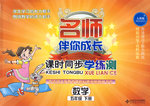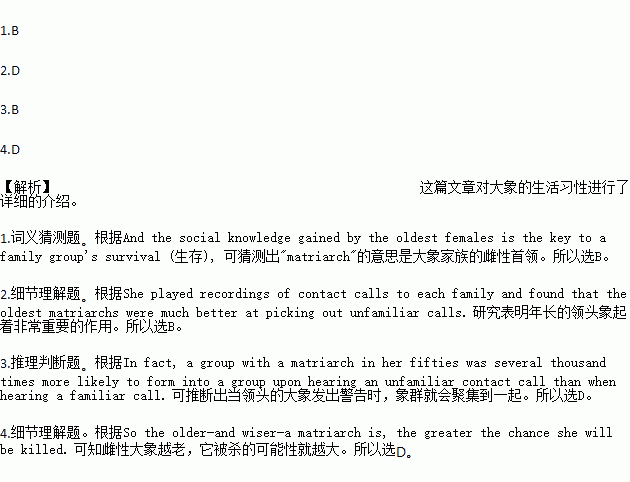题目内容
Elephants don’t forget-at least, female(雌性的) elephants don’t. Elephant families are matriarchal. And the social knowledge gained by the oldest females is the key to a family group's survival (生存), according to a study published in April by Karen McComb, a biologist at Sussex University in England.
Elephants announce their presence by making a deep, long sound, a practice referred to as contact calling(联络呼叫). An unfamiliar call may mean that an elephant from outside the family group is nearby. A stranger can cause trouble. Interrupting feeding or disturbing the young. So an elephant matriarch signals the family to gather around her; then they all lift their trunks in the air to smell the unfamiliar caller. False alarms can disturb the group and take time and energy away from feeding, so survival may depend in part on getting it right.
Working with Cynthia Moss, who founded the Amboseli Elephant Research Project in Kenya 30 years ago, McComb tested the social knowledge of 21 Amboseli elephant families with matriarchs 27 to 67 years old. She played recordings of contact calls to each family and found that the oldest matriarchs were much better at picking out unfamiliar calls. In fact, a group with a matriarch in her fifties was several thousand times more likely to form into a group upon hearing an unfamiliar contact call than when hearing a familiar call. However, families with younger matriarchs were less than twice as likely to gather together upon hearing an unfamiliar contact call as compared with a familiar call. And they gathered together a lot. Moreover, the social knowledge of older matriarchs translated into favorable results: Families with older matriarchs produced more baby elephants in each female-reproductive year.
This finding shows how difficult it is to protect the oldest members of elephant families. As elephants age, they continue to grow larger, as do their much wanted tusks(象牙). So the older-and wiser-a matriarch is, the greater the chance she will be killed. About 800,000 elephants have been killed by people in the past 20 years.
1.What does the underlined word in Para 2 "matriarch" mean?
A. An old member of an elephant family
B. A female head of an elephant family
C. A wise elephant
D. A large elephant
2.The research with recordings of contact calls shows .
A. How fast elephants form into groups
B. How important the age of a leading elephant is
C. How frightened elephants are when hearing a strange call
D. How frequently old elephants call other members of the family
3.When do elephants form into a group?
A. When they are feeding the young.
B. When they see a familiar elephant.
C. When they are giving birth to baby elephants.
D. When the leading elephant gives out a warning.
4.The older a female elephant is, _____.
A. the stronger she will be
B. the poorer memory she will have
C. the more useless her tusks will be
D. the more likely she will be killed
 名师伴你成长课时同步学练测系列答案
名师伴你成长课时同步学练测系列答案假设你叫李华,最近在淘宝网上购买了一双鞋子,但出现了一些问题。
[写作内容]
请给网站写一封投诉信,包括以下内容:
1.投诉内容:
申购情况 | 实际情况 | |
颜色 | 黑色 | 白色 |
号码 | 37 | 38 |
到货日期 | 4月10日 | 4月20日 |
2.要求:重新邮寄或退款;
3.询问:若寄回,谁承担邮资?
____________________________________________________________________________________________
____________________________________________________________________________________________
____________________________________________________________________________________________
____________________________________________________________________________________________
____________________________________________________________________________________________
____________________________________________________________________________________________
____________________________________________________________________________________________
____________________________________________________________________________________________
____________________________________________________________________________

